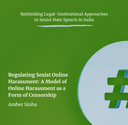Internet Governance Blog
On the legality and constitutionality of the Information Technology (Intermediary Guidelines and Digital Media Ethics Code) Rules, 2021
— by Torsha Sarkar, Gurshabad Grover, Raghav Ahooja, Pallavi Bedi and Divyank Katira — last modified Jun 21, 2021 11:52 AMThis note examines the legality and constitutionality of the Information Technology (Intermediary Guidelines and Digital Media Ethics Code) Rules, 2021. The analysis is consistent with previous work carried out by CIS on issues of intermediary liability and freedom of expression.

Beyond Public Squares, Dumb Conduits, and Gatekeepers: The Need for a New Legal Metaphor for Social Media
— by Amber Sinha — last modified May 31, 2021 10:23 AMIn the past few years, social networking sites have come to play a central role in intermediating the public’s access to and deliberation of information critical to a thriving democracy. In stark contrast to early utopian visions which imagined that the internet would create a more informed public, facilitate citizen-led engagement, and democratize media, what we see now is the growing association of social media platforms with political polarization and the entrenchment of racism, homophobia, and xenophobia.

Regulating Sexist Online Harassment as a Form of Censorship
— by Amber Sinha — last modified May 31, 2021 09:56 AMThis paper is part of a series under IT for Change’s project, Recognize, Resist, Remedy: Combating Sexist Hate Speech Online. The series, titled Rethinking Legal-Institutional Approaches to Sexist Hate Speech in India, aims to create a space for civil society actors to proactively engage in the remaking of online governance, bringing together inputs from legal scholars, practitioners, and activists. The papers reflect upon the issue of online sexism and misogyny, proposing recommendations for appropriate legal-institutional responses. The series is funded by EdelGive Foundation, India and International Development Research Centre, Canada.
Comments and recommendations to the Guidelines for “Influencer Advertising on Digital Media”
— by Torsha Sarkar and Shweta Mohandas — last modified Apr 05, 2021 09:58 AMIn February, the Advertising Standards Council of India (ASCI) had issued draft rules for regulation of digital influencers, with an aim to "understand the peculiarities of [online] advertisements and the way consumers view them", as well as to ensure that: "consumers must be able to distinguish when something is being promoted with an intention to influence their opinion or behaviour for an immediate or eventual commercial gain". In lieu of this, we presented our responses.
Recommendations for the Covid Vaccine Intelligence Network (Co-Win) platform
— by Pallavi Bedi — last modified Mar 25, 2021 01:14 PMNew intermediary guidelines: The good and the bad
— by Torsha Sarkar — last modified Mar 15, 2021 01:52 PMIn pursuance of the government releasing the Information Technology (Intermediary Guidelines and Digital Media Ethics Code) Rules, 2021, this blogpost offers a quick rundown of some of the changes brought about the Rules, and how they line up with existing principles of best practices in content moderation, among others.
Pandemic Technology takes its Toll on Data Privacy
— by Aman Nair and Pallavi Bedi — last modified Jun 26, 2021 06:52 AMThe absence of any legal framework has meant these tools are now being used for purposes beyond managing the pandemic.
The Geopolitics of Cyberspace: A Compendium of CIS Research
— by Arindrajit Basu — last modified Nov 15, 2021 02:48 PMCyberspace is undoubtedly shaping and disrupting commerce, defence and human relationships all over the world. Opportunities such as improved access to knowledge, connectivity, and innovative business models have been equally met with nefarious risks including cyber-attacks, disinformation campaigns, government driven digital repression, and rabid profit-making by ‘Big Tech.’ Governments have scrambled to create and update global rules that can regulate the fair and equitable uses of technology while preserving their own strategic interests.
A Guide to Drafting Privacy Policy under the Personal Data Protection Bill, 2019
— by Shweta Reddy — last modified Sep 20, 2021 10:34 AMThe Personal Data Protection Bill, 2019, (PDP Bill) which is currently being deliberated by the Joint Parliamentary Committee, is likely to be tabled in the Parliament during the winter session of 2021.

Media Market Risk Ratings: India
— by Torsha Sarkar, Pranav M Bidare, and Gurshabad Grover — last modified Jan 25, 2022 01:29 PMThe Centre for Internet and Society (CIS) and the Global Disinformation Index (GDI) are launching a study into the risk of disinformation on digital news platforms in India, creating an index that is intended to serve donors and brands with a neutral assessment of news sites that they can utilise to defund disinformation.
Document Actions


